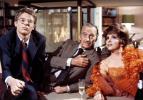Reviews
Jerzy Skolimowski
UK, 1982
Credits
Review by Anna Bak-Kvapil
Posted on 23 June 2011
Source 35mm print courtesy of the Harvard Film Archive
Categories Jerzy Skolimowski: Eros & Exile
One of Skolimowski’s least elliptical films, Moonlighting has a straightforward narrative framework constructed around practical, plebian obstacles. Jeremy Irons plays Nowak, chosen by a rich Warsaw employer to cheaply renovate his London pied-à-terre and supervise a group of three other construction workers. Martial law is declared in Poland soon after they arrive in England, and Nowak, the only English speaker in the group, struggles to keep his workers ignorant of the political crisis, as they must finish the job in four weeks on a pitifully tight budget, regardless of circumstances. The film is suspenseful from the opening scene, as the workers attempt to smuggle their heavy tools and building supplies through British Customs. Muting his headstrong directorial style, Skolimowski also creates one of his most blatantly political films. While Moonlighting was a direct and timely reaction to the 1981 Solidarity crisis in Poland, the broader themes of the film still seem relevant today, as exploitation of illegal labor remains a divisive political issue.
Jeremy Irons is a curious casting choice for the main character. Only a year before, he had become internationally famous as Charles Ryder, the quintessential Oxford student in the cult miniseries version of Evelyn Waugh’s Brideshead Revisited. For Irons, playing a Polish construction worker with a rudimentary grasp of English was an abrupt and astute departure from the BBC ghetto of costume drama aristocrats and roués. As Nowak, he appears to be almost a different species from his proletariat companions, looking more at home in tailored suits than overalls, his long, pale hands suspiciously uncalloused. But he is excellent in the role, the malnourished and nervous quality of his face and his fathomless deadpan stare giving refined dimension to the otherwise simple character of a burdened foreman marooned in a hostile environment.
The London of Moonlighting is, like most Skolimowski locations, chilly, barren, and indifferent. For the workers, the city is limited to a handful of shops (a grocery store, a department store, a hardware store, and, bizarrely, a Wrangler boutique) and the house they’re renovating in the respectable Onslow Gardens. While the townhouse exterior looks cheery and decent, the workers live in the empty mildewed rooms like refugees, foregoing baths as they work on plumbing, eating thin soup out of old cans, huddling in sleeping bags on bare floors at night. Still, London offers a bounty of things that Warsaw lacks. When the group first enters a British supermarket, they gaze around in awe at the towers of canned goods and shelves of Coca-Cola.
Nowak’s bumbling, poker-faced compatriots, Banaszak, Wolski, and Kudaj, are like cautionary characters from a folk tale (especially Banaszak, who makes countless dumb mistakes, and is often called an idiot by Nowak). Increasingly isolated and overworked, they become ever more hapless and childlike, entirely reliant on Nowak to provide and communicate for them. Skolimowski seems to hold these uneducated and unsubtle Poles in contempt, contrasting them with the more aware and intelligent Nowak, the two factions representing the duality of the national character.
If Skolimowski treats the workers with a lack of affection, he handles British characters with complete distrust and playful derision. The cultural divide is cavernous, and Nowak says, “I can speak their language, but I don’t know what they really mean.” No businesspeople or neighbors display a flattering moment of empathy for the desperate and disoriented Nowak; instead, they take advantage of his ignorance, swindling and stealing from him. Nowak, a quick learner, becomes a petty thief in turn, defrauding a grocery store and pilfering sweatshirts and scarves. He becomes bolder, but uptight shopkeepers are again and again foiled in their attempts to catch him in the act of shoplifting. Small instances of absurdist humor leaven the precarious situations Novak finds himself in, as a woman takes her shirt off as he walks by a picture window, and a car crash occurs outside a store as he narrowly escapes being caught for shoplifting.
Main characters in Skolimowski’s films are largely silent, often observing rather than interacting (a concept taken to its most extreme point with the entirely dumb antihero of Essential Killing). For much of Moonlighting, Nowak says little, but his thoughts are communicated through terse voiceover, as he pines for his wife, ponders the best method to pilfer food, and agonizes over the events unfolding in Warsaw. The calm, meditative tone of voice he expresses his thoughts with contrasts with his awkwardly perilous actions, and his perpetually horrified expression.
Moonlighting is ultimately about the crushing responsibility of leading even a few people. While Nowak knows he’s smarter than his men, he also hates the ways he must manipulate them, and begins to loathe himself as the job progresses. He is uncomfortable with the insidious cruelty that seeps into any act of leadership. While he provides for his followers, he can’t mute the impact of the truth about Poland’s political fate, and his largest failure is also his final act as foreman.
More Jerzy Skolimowski: Eros & Exile
-

The Shout
1978 -

Moonlighting
1982 -

The Lightship
1985 -

Success Is the Best Revenge
1984 -

Torrents of Spring
1989 -

King, Queen, Knave
1972
We don’t do comments anymore, but you may contact us here or find us on Twitter or Facebook.



